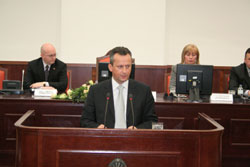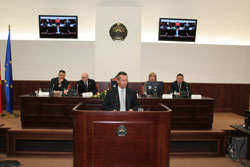Thursday, 26 February 2009
ADDRESS AT THE OPENING OF THE PARLIAMENTARY LIBRARY


Distinguished devotees of books and knowledge,
Your Excellencies,
Distinguished Fellow Parliamentarians,
Distinguished Guests,
Every person in his nature strives for knowledge. Every family has in its home a corner that provides it with a particular warmth, shelves where favourite books are placed from which we have learnt new facts and which have broadened our spiritual horizons. Our parliamentary house has today attained exactly this type of first-rate space with a couple of corners that should become a driving force behind an enhanced research capacity of the Assembly.
Parliamentary libraries are the most outstanding segments of any Parliament. They are the focal points of the parliamentary spirit where information and research are translated into the knowledge required in order to have not only good legislative process, but also effective oversight over law enforcement. The realisation of this project is expected to increase the access of MPs and the staffers in the Assembly of the Republic of Macedonia to the documentation and research potential of the libraries and research centers in the parliaments of other countries, the EU, Council of Europe and other international organisations, and in particular the US Congress Library, parliamentary libraries of the EU member states and obviously our national libraries.
In terms of the cooperation in this segment with the European Union, it is expected that, as part of the projects under the IPA funds, the parliamentary research capacity will be upgraded once the accession negotiations start by establishing a department in the library with literature on the EU acquis.
The Hall which hosts the Assembly's Library was built in 1954, and was apparently in a bad condition and rarely used. It was refurbished so as to restore and preserve its authentic design while adding the necessary IT equipment. Furthermore, it has been equipped with IT voting and TV broadcast systems, so that its performance is compatible to that of the Plenary Hall.
The idea to strengthen the Assembly's capacity was initiated by the end of 2006 during the visit of four Members of the US Congress - from the House of Representatives Democracy Assistance Commission. Only a year later, in Wilton Park, UK, we jointly adopted an Action Plan including a set of measures in this segment which we are on a good path to carry out over the course of the year. Through study visits of delegations including MPs and staffers to the US Congress and a couple of European parliaments, we have acquired the necessary comparative knowledge on the direction we are to take in order to strengthen the Assembly's capacity, autonomy and transparency.
Since its independence, Republic of Macedonia has passed through an intense process of institutional and legal reforms. Similarly to the other countries in transition, this process in RM featured adoption of numerous laws, some of which have for the first time been introduced in our legal system.
The current situation, too, requires intense legislative activity and complex harmonisation with the European acquis. In order to avoid repeating weaknesses, high level of legislative consistency is needed, as well as monitoring of the implementation of laws.
In this beautifully refurbished space we have actually obtained a stimulating working environment which I hope will host public debates on the adoption and implementation of laws. We have created conditions for conducting parliamentary assessment of the quality and coherence of the proposed laws, assessment as to their impact and effect over the concerned parties or groups i.e. whether the proposed laws are clear, specific and comprehensive enough, which are the benefits they will provide, whether they exceed the envisaged expenses and whether they are equitably distributed.
Besides the investment in modern IT equipment at the disposal of MPs and the staff, active process is underway to strengthen the human resources potential of the Assembly.
The National Programme for the Accession in the EU envisages around 70 new employments in the period 2008-2011, focused on strengthening the work of parliamentary committees and research capacities.
Moreover, we have considered the possibility to establish a separate research center linked with the academic community - following the example of the European Parliaments and the US Congress Library - that would directly supply the MPs with high-quality and unbiased research studies necessary for their legislative and oversight duties. In that sense, I should mention the funding allocated since recently by the Assembly to pay for the assistants in the MPs constituency offices.
The establishment and the activities of the Assembly's Budget Council will contribute for a continuous financial support to optimize the capacities of the Parliament as a whole.
The research base and capacity of the Assembly for an active participation in the legislative process will be additionally enriched with the E-Parliament Project that will provide access for all MPs to the research capacities of the Government and ministries.
The creation of the basic research preconditions opens a possibility for an active participation of the Assembly of the Republic of Macedonia in the Global Legal Information Network (GLIN) and research cooperation with the US Congress Library.
On this occasion I would like to thank the US House of Representatives Democracy Assistance Commission, the US Embassy - including the USAID and NDI - and the other embassies in the Republic of Macedonia for their cooperation so far, for the donations of books and professional publications. I hope that the successful cooperation will be continue and broaden in the future.
Thank you.